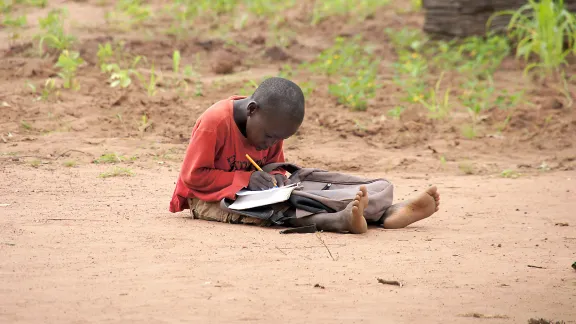
A young boy doing his homework in Yida refugee camp, South Sudan. Photo: LWF/ M. Hyden
LWF Provides Education Support and Protection to Children in South Sudan
On 20. November, countries worldwide celebrate the Universal Children’s Day. In their humanitarian work, The Lutheran World Federation places special emphasis on education. The EU Children of Peace Project for over-age learners is one example how the LWF ensures children’s education in areas of conflict.
(LWI) – Fourteen-year-old Nafisa Hamad Kuku from South Kordofan, Sudan, is in the Lutheran World Federation (LWF)-coordinated accelerated learning program (ALP) at the Ajuoug Thok refugee camp in South Sudan. She wants to go to university to study medicine after she finishes the course.
“I would like to be a surgeon to help people back home or anywhere in the world,” she said. “In doing so, I’ll share the knowledge I will have acquired at school.”
Through the European Union (EU) Children of Peace project, the Lutheran World Federation (LWF)’s is helping to educate 3,615 children in South Sudanese refugee camps whose schooling has been impacted by the conflict in Sudan.
The LWF-coordinated accelerated learning program (ALP) is being offered to children in the Yusuf Batil and Kaya refugee camps (Maban county) in Upper Nile State and Ajuong Thok camp in Unity State. The goal is to give children and young people affected by conflict access to schools where they can learn in a safe environment and also receive psychological support to help them heal from the trauma of war.
“For many children, their normal participation in the education system has been interrupted due to conflict and war in Sudan, which has resulted in over-age learners enrolling in primary education,” said Anek Cavine, Department Program Coordinator for LWF South Sudan.
“For instance 36% of the children enrolled in primary school were over-age learners, which means we see many 17-year-old students attending the same classes as seven- year-olds. “
Most children enrolled in the ALP program currently operating in 12 primary schools in the camps are able to complete two grades in one year.
“My most memorable experience in working with these children is their willingness to enrol in schools and learn despite the age differences among them. We even had some child mothers who missed out on their education. They were so eager to learn that they would bring their babies along at first, before we could identify caregivers to support them,” Cavine said. “This is really a big motivation to continue supporting these children to go further with their education.”
Additional support from the LWF includes teaching and training material, help desks and child rights clubs as well as training opportunities for teachers to be able to respond more effectively to child protection incidences within the camps. The ALP students also gain increased educational awareness about the dangers of armed conflict and issues surrounding violence and protection, and have greater access to child/youth protection mechanisms.
“Not only can education enhance future employment prospects, it can also provide valuable psychosocial support and life skills, which includes developing children’s self- esteem,” Cavine said.
The Children of Peace project is funded by ECHO – the EU humanitarian office – and was established after the EU won the Nobel Peace Prize in 2012. Cavine will be taking part in the International Children’s Day Google Hangout at 2.00pm on 20 November, aimed at highlighting the work of the nine EU Children of Peace projects. The LWF has been providing access to education as part of its emergency assistance to South Sudanese refugees in both states and other regions of South Sudan since 2012.
ECHO Children of Peace web site


